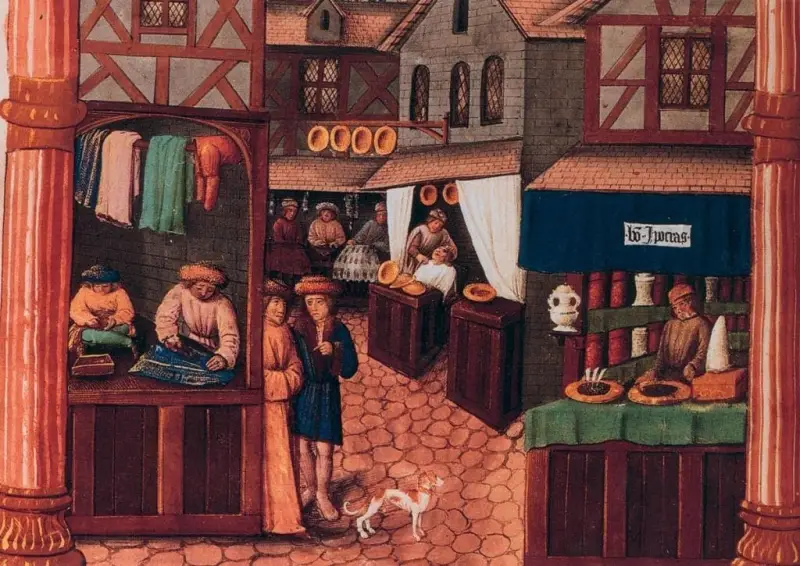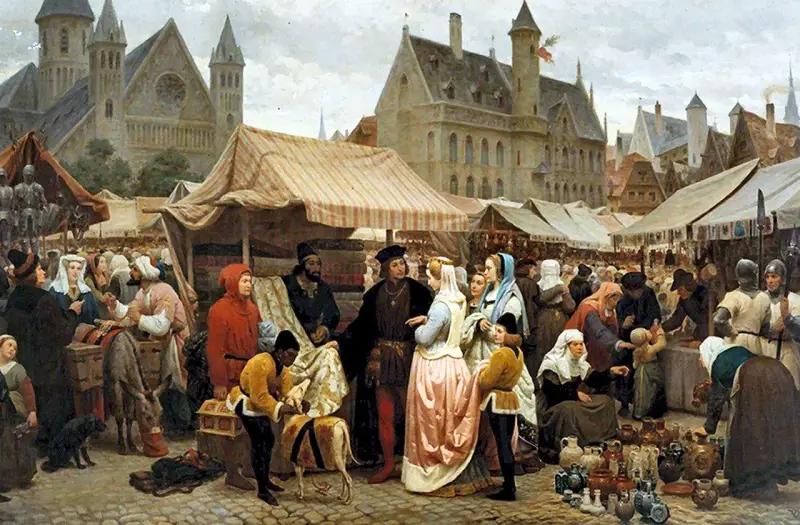Merchants in the Middle Ages

Trade in a medieval city. French miniature of the 15th century.
Traders have existed for centuries. They played an important role in the development of many ancient cultures and helped them learn from each other. During the Middle Ages, merchants transported goods to and from Europe. Although their role in society was not valued as highly as other professions, they were an important link in the development of Europe and the rest of the world. Especially during the Crusades.
General characteristics
At that time, the other classes of Europe based their wealth on the amount of land they owned, and merchants had cash on hand, which became increasingly necessary as the Crusades progressed. As a result, the role of merchants changed somewhat: from hated consumers, they turned into respected members of society who had their own rank and weight.
Merchants traded various things. In fact, they traded everything that, in their opinion, had at least some value to others. On their travels, traders also collected interesting things for themselves. This made merchants famous for their role during the French Renaissance, as they often had extensive collections of art from their travels. Some of them were passed down by inheritance, some were kept in guilds for years.
The traders did not make anything themselves. Instead, they were intermediaries between producers and consumers. Although merchants initially only traded goods needed for survival, they later began selling more valuable items to the nobility at high prices. Merchants received mountains of money for such goods, and the nobility felt their status.
The main products were:
• slaves;
• perfumes;
• silk and textiles;
• horses;
• spices;
• gold and other precious stones;
• leather products;
• animal skins;
• salt.
How did people treat merchants in the Middle Ages?
In the Middle Ages, merchants had a bad reputation, thanks to the feudal system that existed then. According to feudalism, your importance and social status depended on how much land you owned. Most professions belonged to peasants, who were farmers, bakers or skilled workers.
Landowners included nobles, knights and royalty. The royals and clergy held the most power in the country, followed by the knights and nobles. Peasants worked the farms and paid taxes to landowners for protection and housing.
Since merchants did not fit into the feudal system of that time, the church did not particularly like them. She believed that merchants had no honor because their trade was profitable. They also did not own land, which made them even more isolated.
The Church called merchants "consumers" because they did not produce their goods themselves. People on earth had only one duty - to prepare themselves for a blissful afterlife. They had to follow in the footsteps of Jesus, caring for the less fortunate, while living in poverty themselves.
The Church categorically rejected the collection of earthly property and therefore refused to lend money and make a profit. However, she was unable to withstand the tsunami of change, and in the 13th century she adjusted her position. For the first time in stories she recognized that people are allowed to strive for happiness on earth.
Christians were not allowed to become merchants, so this profession was often reserved for Jews. Of course, some traders sold products from their lands in markets. They were treated differently from international merchants, who were essentially resellers.
Due to their bad reputation, the market was difficult for foreign traders. They often had to wait several hours before gaining access to the market. Foreign traders also paid higher taxes on goods imported into a city or country.
Local residents and nobles benefited from them through taxes. However, merchants were often considered an inferior class, and nobles, knights, and clergy unnecessarily avoided working with them.
However, despite their bad reputation, the foreign trade sector continued to grow throughout Europe, meaning that the same people who looked down on the merchants had no problem buying the luxury goods they sold.
Merchants often had to entertain and impress nobles in order to gain their favor and respect. The support of an aristocrat gave merchants security and status in society. Traders transported medicines from different countries, which helped Europeans monitor their health.

"Fair in medieval Ghent." Felix de Vigne
The merchant's road is hard
Given the poor reputation of merchants, they received no assistance or protection from the nobility when entering a new country or province. They also traveled with expensive goods and usually had money with them, which attracted robbers.
In the Middle Ages, there were two types of logistics: land or sea. Of course, most foreign merchants traveled by sea, buying goods and bringing them home. Sea logistics was cheaper and often safer, but not all goods could be transported by sea. For example, cattle. Traders traveling by sea had to deal with pirates and bad weather. In addition, merchants disappeared for several months, leaving their families without protection.
On land, bandits and thieves often attacked merchants for money and goods. Roads between cities were often in poor condition, and travel along them in the Middle Ages was not as fast as it is now.
Trade guilds
During the Middle Ages, merchant guilds played a significant role in the regulation and growth of trade. They were created as collectives of traders working for mutual benefit and protection. They played an important role in the development of trade routes and the establishment of trade practices in Europe, and their influence is still felt even today.
Guilds provided a sense of community and support for merchants navigating the complex economic landscape of the Middle Ages. They regulated trade, set standards for goods and services, and looked after the welfare of their members. They were responsible for fair competition.
The hierarchy of trade guilds was complex and dependent on the region. However, some common features and ranks can be identified.
At the top of the structure were the chief merchants or craftsmen, who held the most important positions and controlled the affairs of the guild. They were responsible for negotiating with other guilds and overseeing the activities of their guild.
Below the masters were journeymen, who were trained and considered skilled workers. They had some rights within the guild, including the ability to vote in elections and participate in certain events. Journeymen constituted the lowest level of the guild hierarchy. They were inexperienced and had to work their way up the ranks by undergoing training and demonstrating their skills.
Joining a merchant guild in the Middle Ages required a significant investment of time, effort, and resources. Potential members had to undergo a rigorous apprenticeship system that could last several years. Once the student completed his training, he could apply for admission to the guild.
However, membership was not automatic, and potential members had to meet a variety of criteria. These include demonstrating your skill level, providing evidence of financial stability, and being sponsored by an existing guild member.
Membership in a trade guild was highly coveted as it provided members with a number of benefits and privileges. These included access to exclusive trading networks, protection from external competition, and the ability to influence trade rules and standards.
Many kings viewed the merchant guilds as a threat to their power and sought to limit their influence on trade. For example, in some regions, rulers imposed taxes or duties on goods traded by guilds. Sometimes they were abolished, viewing the guilds as a threat to their power and control over the economy.
Hack and predictor Aviator
The life of a merchant in the Middle Ages was not luxurious. The Church considered them consumers and immoral. Traders often faced danger when traveling to new countries and cities. But they still played an important role in medieval society.
Information